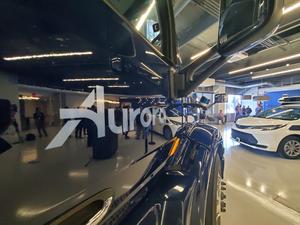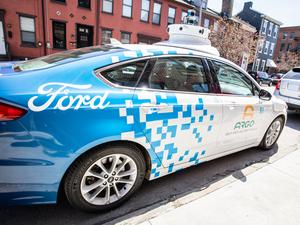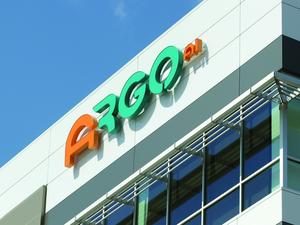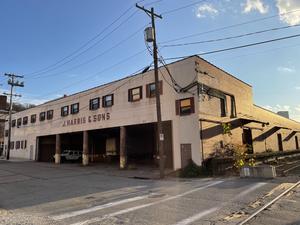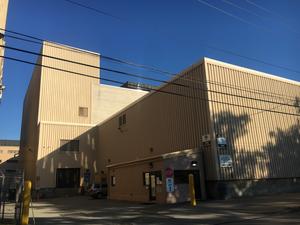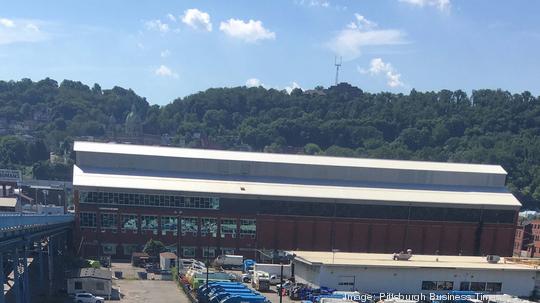
Aurora Innovation Inc. (NASDAQ: AUR), facing financial pressure amid a larger tech industry consolidation, is working to sublease one of the biggest spaces in Robotics Row it inherited when it bought Uber's Advanced Technology Group.
A local team of CBRE led by Kim Clackson launched an email blast seeking to sublease the more than 110,000-square-foot Crucible Building at 31st and Smallman Street, a former mill shed rehabbed into three floors of tech-friendly office space.
Clackson wasn't immediately available for comment.
But Aurora confirmed the decision in a prepared statement, highlighting the company's new headquarters along Smallman as the building it is emphasizing.
"Aurora opened our Pittsburgh headquarters at 1600 Smallman St. in April – providing more space for our growing team as we refine and commercialize our self-driving technology," an Aurora spokesperson said in an email. "Since then, we’ve moved teams from The Crucible space to our HQ to consolidate our footprint and help Aurorans work more closely together when in the office."
The spokesman emphasized the company has 800 employees in Pittsburgh and is seeking to hire 40 more, explaining, "with more team members now able to fit in fewer offices, we’re leasing out The Crucible space so it doesn’t go unused."
CBRE is pitching the property, located at 3011 Smallman St., as a "one-of-a-kind office sublease opportunity," in which Aurora's lease term is scheduled to expire at the end of 2026, leaving about four years left but with options to extend.
The marketing materials maps out what is a central location along the Strip District's Robotics Row neighborhood, highlighting all the different tech firms in close proximity as well as the variety of traditional restaurants and retailers close by.
Aurora's decision to sublease its space at The Crucible is likely one of the most recent public cost-saving initiatives made by the company amid an industry that's been rocked by funding-related hardships. Pittsburgh-based Argo AI LLC, a neighbor to Aurora in the Strip District, shuttered operations completely in October when its main backers, Ford Motor Co. and Volkswagen AG, announced they'd no longer be funding the startup's autonomous vehicle venture.
But despite this context, Aurora has maintained it has enough cash to see through the commercial deployment of its self-driving trucking product.
During Aurora's Q3 earnings call in November, the company disclosed it had about $1.2 billion in cash and short-term investment reserves, most of which came from its November 2021 IPO. That's a figure that is set to last the company through mid-2024. The company had $203 million in operating expenses during its Q3 this year.
However, it was during the company's Q2 earnings call that it announced that the deployment timeline for the Aurora Driver — the company's name for its self-driving technology consisting of sensors, computers and other elements — had been pushed back. Aurora previously envisioned shipping that product by the end of 2023, and Aurora CEO and Co-Founder Chris Urmson cited supply chain-related constraints and other challenges facing the trucking industry more broadly as some of the reasons for the delay.
The Crucible Building was an address for tech firms before Uber came to town and dramatically started leasing up space in the Strip in the middle of the last decade, serving as the one-time home of ModCloth, the once fast-growing e-commerce company that specialized in vintage-inspired fashion before it was acquired and moved out of town.
The one-time mill for Crucible Steel now refashioned as an office property next to the 31st Street Bridge wasn't the only real estate Aurora inherited when it bought Uber in 2020. At the time of the deal, Uber had a number of other facilities as well, totaling over 300,000 square feet stretching through the Strip District and into Lawrenceville.
The other major one is the former Uber Advanced Technology Center, the one-time location of Restaurant Depot just a block away at 100 32nd St. along the riverfront.
Close real estate observers have expected Aurora to shed some of the space it inherited in the Strip and Lawrenceville from Uber since it first bought out the tech firm's presence here in a deal completed in late 2020.
Pete Licastro, president of North Hills-based Point Bridge Realty Advisors, expects the space will get attention in a Strip District filling out with a strong wave of apartment development even as the tech industry may seem a bit sluggish at the moment.
"It's the type of modern space that a lot of tech-oriented companies are looking for, not withstanding the fact that the sector is going through some contraction on a macro level," he said. "If you were going to build out tech-flex space today, this is pretty much how it would look."
